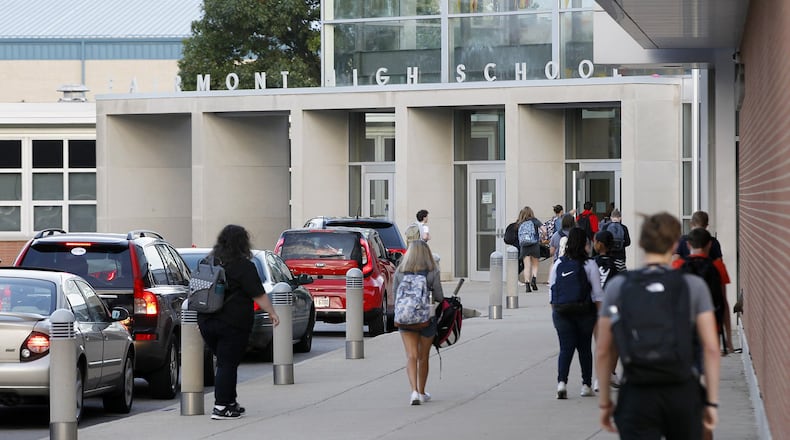The incidents raised the question of what access rights the general public has to buildings such as public schools and government offices.
Montgomery County Sheriff’s Office representatives told this news outlet Monday that people who enter a school building and violate a district’s approved policies can be asked to leave. If they fail to leave, law enforcement can charge people with criminally trespassing, a sheriff’s spokesperson said.
As for government offices, the sheriff’s office said it has responded to a few calls of people video-recording in public buildings so far this year.
In most cases, the sheriff’s office advises government employees that they should allow people to make recordings if they are doing so in a publicly accessible area. But the sheriff’s office also advises that agencies consult their legal representation to review policies, the agency’s spokesperson said. They also suggest clear communication to the public, such as signage, regarding accessible spaces.
When it comes to schools, the sheriff’s office advises them to consider requiring all visitors to register when they arrive on school grounds.
West Carrollton Superintendent Andrea Townsend told her district’s parents the man showed up at West Carrollton High School on Oct. 9, identifying himself as a “first amendment rights auditor” and requesting access to the building to walk around, record video and ask staff members questions.
“For the protection and privacy of our students and staff, the request was denied,” Townsend said in the letter. “The individual was immediately detained and questioned by the principal and SRO (school resource officer). This occurred during class time and no student was either photographed or videoed. The individual was asked to leave the high school and did so.”
Townsend said the man being admitted to the school “was not per our protocols.” She said she immediately had the man trespassed from all West Carrollton School properties and informed Miami Twp., Moraine and West Carrollton police departments.
Similar incidents were reported in the past week at other schools regarding the same individual.
After attempting to gain access to Miamisburg’s Bauer Elementary Oct. 9, that district implemented a soft lockdown there that day.
“For the protection and privacy of our students and staff, the district denied the individual entrance to the building,” Laura Blessing, the district’s superintendent, said in a message. “The individual remained on school property, therefore, the district implemented a soft lockdown where the school day continued as usual with the exception of indoor recess and the rerouting of buses and parents for kindergarten pickup and drop off.”
The district enacted the same measure at all of its schools the following day, officials there told this news outlet.
On Friday afternoon, an incident at Kettering’s Fairmont High School occurred when the man took photos and videos and refused to leave school grounds, Principal Karyn Denslow said in a letter to families and staff.
Denslow said she “politely” asked the man to leave “because his harassing presence was causing a disruption, to which he refused.”
After being given a copy of the Kettering school board policy allowing Denslow the power to prohibit someone from entering school property, he again refused, leading to the Kettering police school resource officer’s involvement.
The man “advised that he did not have to leave and I explained to him that the people responsible for the property have the right to ask him to leave,” police School Resource Officer Lester Spinks wrote in a document.
“I advised him that if he continued to stay, against their wishes, he could be charged for criminal trespass,” Spinks wrote. The man “ultimately left the property without any further protest.”
Denslow said in the letter that the man “is apparently traveling to schools across the greater Miami Valley doing what he claims are ‘audits’ of school operations, so there is a chance he may return to Fairmont or to another of our schools.”
District officials “are aware of this man’s modus operandi, as well as the policies we have in place in Kettering to limit this type of disruption at any of our schools,” the letter states.
West Carrollton, in reaction to what occurred, started announcing new protocols for school building entry late last week, saying no student or staff, other than main office staff, could open a locked door for anyone, and that all visitors, parents, students and district employees must enter through the front door during school hours.
In addition, parents and guardians must not only report directly to the main office, ring the bell and speak to the office staff, they also must identify themselves, show identification, identify the student that attends the school and state the reason for their visit.
Also, “office staff must search the student information system for the student contact list to verify the parent or guardian name,” the district said. “Once it is determined the parent or guardian is on the student’s contact list they will be granted access.”
Kettering schools this year expanded a program that requires visitors to their school buildings to scan their driver’s license or state ID to go beyond the main office. District spokeswoman Kari Basson said the system can identify sex offenders and people the school district has flagged for other concerns.
The system was tested at Fairmont High School last school year and is now in all of the district’s schools, Basson said.




